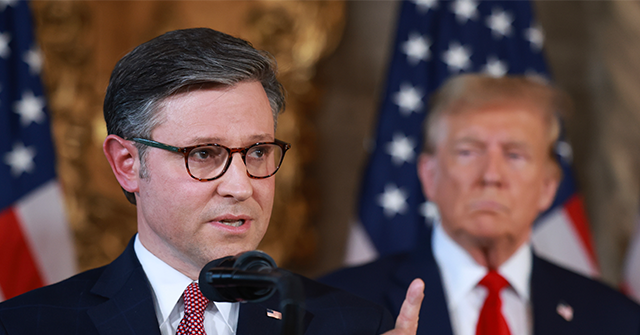In recent discussions surrounding Speaker Mike Johnson’s recent legislative maneuvers, prominent conservative commentator Tucker Carlson voiced grave concerns regarding his leadership and decision-making. Carlson noted with dismay Johnson’s handling of a significant spending bill, which stretched over 1,500 pages and ultimately aligned with Democratic priorities, disappointing many conservative allies. Eduardo Neret, a former producer for Carlson, echoed these sentiments, highlighting that Johnson, on the eve of Trump’s inauguration, attempted to push through a comprehensive bill that would grant Democrats, particularly Chuck Schumer, substantial leverage as the debt ceiling approached. This moment, characterized by a lack of clear foresight, has left many questioning Johnson’s capability to lead effectively and cater to the interests of his party.
Carlson specifically criticized Johnson for prioritizing the funding of Ukraine at a time when pressing issues such as the U.S. border situation were seemingly neglected. He expressed bewilderment that Johnson would focus on supporting a foreign nation without proper oversight while domestic issues lingered unresolved. The choice to prioritize Ukraine was interpreted as an indifference, if not a betrayal, of American interests, with Carlson suggesting that this could even be considered a form of treason—a serious allegation, illustrating the gravity of Johnson’s missteps in the eyes of his critics. Carlson underscored that such patterns of behavior are not isolated to Johnson, highlighting a broader disillusionment with similar conduct from many in Washington.
The implications of Johnson’s actions have been further exacerbated by the recent House vote, which reflected a significant concession to Democrats. The agreement resulted in a temporary extension of spending levels through March 14, 2025. In this vote, every Democrat supported the bill, with a substantial majority of Republicans also aligning with them to pass the measure. This bipartisan support demonstrates a troubling trend where Republican representatives, frustrated by the complexities of governance and eager to escape for the holiday break, opted to prioritize short-term ease over the fiscal concerns that conservatives typically championed. The lack of unity among Republicans, as evidenced by the disparity in votes, has left Johnson’s leadership under a microscope, stirring unrest and apprehension within his party.
The aftermath of the spending bill has revealed cracks in Johnson’s support base. Notably, Rep. Thomas Massie became the first Republican to formally withdraw his support for Johnson’s Speakership in light of the recent vote. As members of Congress turn their attention to the upcoming Speakership vote scheduled for January 3, 2025, Johnson’s future remains precarious. The sentiment that he has lost the confidence of a portion of his conservative colleagues looms large, reflecting a crucial divergence in the party that could impact not just his leadership but also the broader strategy and cohesion of the Republican agenda moving forward.
Carlson’s fervent criticism and Neret’s observations point to a worrying trend of disconnect between the leadership and the bases they’re meant to represent. This disconnect raises questions about priorities within the Republican Party, particularly in balancing foreign aid and domestic issues. Many party members and constituents are increasingly vocal about their dissatisfaction with leaders who seem out of touch with the pressing needs of their own citizens. As the party grapples with these tensions, the upcoming vote will serve as a crucial litmus test for Johnson’s viability and the potential realignment of priorities among conservative lawmakers.
In this politically charged landscape, the actions and decisions made by leaders such as Mike Johnson will continue to shape the discourse within the Republican Party. Carlson’s concerns about treasonous behavior and misplaced priorities underscore a deepening rift that could influence not only Johnson’s fate but also the party’s strategies leading into future legislative battles. As conservatives search for a path forward, they will need to reconcile their national priorities with the grassroots sentiments that drove their electoral success, ensuring that their leadership is aligned with the values and needs of their constituents.

